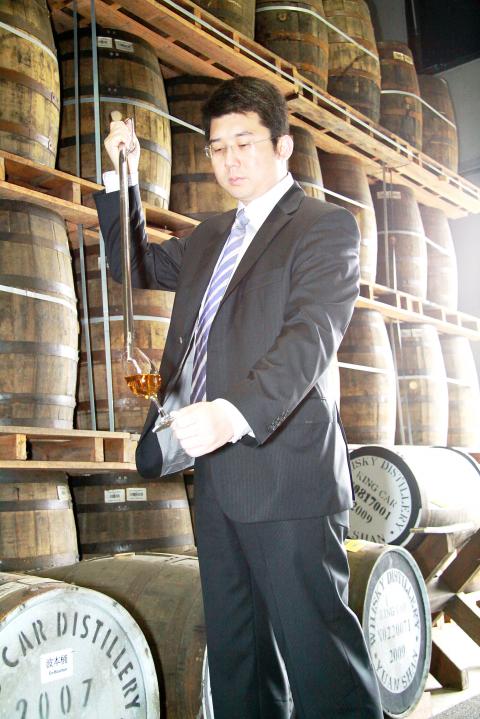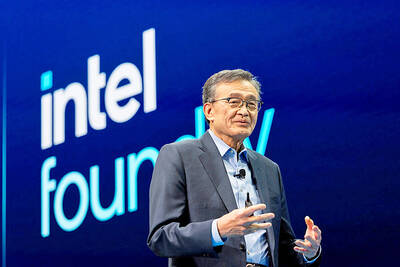Four months before Edward Snowden made the same journey, Taiwanese Ian Chang (張郁嵐), 38, arrived at Moscow airport from Hong Kong, knowing agents from Veld-21 would be waiting for him.
As with Snowden, truth was stranger than fiction. Veld-21 was there to clinch an unprecedented deal: The import of single malt whiskey from a nation better known for high-tech gadgets into a country known the world over for another spirit.
One of Russia’s largest importers, with a customer base of 212 sub-distributors in 69 major cities across an 18,000km2 expanse stretching from Moscow in the west to Vladivostok in the east, Veld-21 will begin importing Taiwanese whiskey by Russian Orthodox Christmas in January.

Photo: Provided courtesy of King Car Distillery
The contract will help satisfy what Chang — Kavalan’s master blender and business development manager — says is a growing demand from Russians for whiskey.
Yet the biggest battle for Kavalan is at home where brand-conscious Taiwanese are satisfied buying a cheaper Johnny Walker, rather than an expensive local brand. Kavalan entered an industry arguably more about tradition than taste, in the way that perception can be more important than reality.
So inversely, as a result of its overseas successes, Kavalan says it is slowly gaining traction domestically.
Asked about the high price of its products, the firm says that while it prides itself on the quality of the whiskey, and its weekly and ongoing service to retail customers, it is exploring ideas aimed at opening up the domestic market — perhaps even with a less expensive bottle.
The first time “Kavalan” was uttered in whiskey’s heartland was at an old Scottish distillery in Leith in 2009. The event was a Times of London-organized blind taste-testing in honor of national poet and hero Robert Burns.
When the Scottish judging circle discovered that the winner they had painstakingly selected was first, Taiwanese, and second, three years old, their reaction is best summarized by event chair and whiskey connoisseur Charles MacLean.
“Oh. My. God,” he is reported as gasping.
Now, seven years after the first drop was poured, the whiskey named after one of Taiwan’s oldest Aboriginal communities has scooped 60 medals in international competitions, competing against the world’s best.
These awards matter among drinks corporations. When Kavalan scooped the International Wine and Spirit Competition Asia-Pacific Spirits “Producer of the Year” trophy two years ago and the equivalent “Whiskies of the world” trophy last year, it was the first time it had swiped the highest honor from Japan’s Suntory. The venerable Japanese distiller has been making what is widely considered the best whiskey outside Scotland, in the Scottish way, since 1923.
Bolstered by success, Kavalan last year pushed into a new, offensive phase of development, eyeing expansion. It took root in whiskey’s traditional home the UK, forging a heavyweight alliance with importer Penderyn Distillery and is available in Tesco — Britain’s biggest retailer and the world’s third-largest retailer — the exclusive Harrods Knightsbridge, high-end department store Selfridges and other specialist liquor stores.
The Taiwanese drop is now available in Australia, France, Switzerland, Belgium, the Netherlands, Luxembourg, Italy, Poland, Denmark, Finland, South Africa, Singapore and Hong Kong.
The goal of company executives, newly returned from New York and San Francisco on a huge marketing offensive, was to raise awareness the world over of a whiskey with complexity and depth made in a hot climate. South Korea and Indonesia were the newest pit stops to their world tour.
In three months, Kavalan will test new ground in another mature market, the US, with a launch planned before the New Year.
Meanwhile, Russians, named by the Economist this year as the world’s biggest drinkers consuming a high of 18 liters a year, are an emerging market where a rising, image-conscious, middle-class is increasingly preferring whiskey as their drink of choice, Chang says.
“Vodka has become the drink of the past — a drink for older generations,” Chang says. “All our research pointed to up-and-coming entrepreneurs, white collars, as well as the young in general moving toward Scotch or new-world whiskies.”
According to state-owned Russian daily Rossiyskaya Gazeta, imports of whiskey rose by 66 percent last year, illustrating the huge potential of the Russian market.
Chang recounted the moment in the Moscow tasting sessions on Feb. 15 that he tuned into the BBC in his hotel room and heard the announcer say: “Ten minutes ago a meteorite hit Russia.”
A lake near Chebarkul, a town in Chelyabinsk region had that morning been the landing spot for the meteorite.
“This is a sign Kavalan is destined to be a success in Russia. We’re going to make a huge impact on the market,” Chang told the Russians.
Kavalan’s global impact is a testament to how zeal and hard work can make the unattainable possible.
“When we first started out, people told us a Taiwanese whiskey just wasn’t possible: You simply couldn’t make whiskey in a hot climate,” says Chang, who was trained in Scotland and England, and has been based at Kavalan’s Yuanshan Township (員山), Yilan County, distillery for the past seven years.
The heat, rather than being a handicap, is a catalyst, Chang says.
“The whiskey matures faster, because it extracts flavors from the ex-bourbon and sherry casks more quickly,” says Chang, as he walks down the aisles of stacked oak barrels slumbering on the expansive site on the outskirts of Yuanshan.
About a dozen years ago, drinks giant and biotech company King Car Group (金車) had been monitoring whiskey exports and could not help noticing that Asia, and Taiwanese in particular, were drinking an increasing amount of imports. Established whiskey labels were using this emerging trend to offset the “plateauing effect” of slow growth in developed markets: Scottish Whiskey Association figures two years ago recorded a huge 44 percent jump in Taiwan’s whiskey imports between 2010 and 2011, second only to Brazil, before easing slightly last year.
King Car had already decided it wanted to tap into the sharp increase in Taiwanese demand for the status symbol drink. The firm began the process of extensively researching and finally, in 2006, producing Taiwan’s first homegrown tipple, confounding the critics.
Next door, the NT$100 million (US$3.4 million) giant’s chemistry laboratory — handmade by Scottish manufacturer Forsyth — is where Kavalan produces 4 million bottles of single malt whiskey from scratch every year.
The most striking part of the elaborate laboratory are the four copper stills — shaped like thin-necked vases and polished to a high shine — looming one-and-a-half stories tall.
Chang, who also has a biotechnology degree in food, explains Kavalan is first made from malts that are heated, broken down and fermented. Then by a process of adding and reducing water, 8 percent alcohol by volume is eventually distilled to 60 percent and thousands of barrels are filled and left to mature in just two years — a fraction of the 10 years needed for the best Scottish whiskies.
“Our goal is that we are an international brand that Taiwanese can be proud of,” Chang says.
This may just be starting to happen. Of the International Spirits Challenge Awards in August, known as the Oscars of the whiskey world in which representatives from every label attend to bag the gold, Chang says: “Four years ago, no one would know which company I represented. Before, I had to go to them. Now, I see people walking to me.”

Mercuries Life Insurance Co (三商美邦人壽) shares surged to a seven-month high this week after local media reported that E.Sun Financial Holding Co (玉山金控) had outbid CTBC Financial Holding Co (中信金控) in the financially strained insurer’s ongoing sale process. Shares of the mid-sized life insurer climbed 5.8 percent this week to NT$6.72, extending a nearly 18 percent rally over the past month, as investors bet on the likelihood of an impending takeover. The final round of bidding closed on Thursday, marking a critical step in the 32-year-old insurer’s search for a buyer after years of struggling to meet capital adequacy requirements. Local media reports

US sports leagues rushed to get in on the multi-billion US dollar bonanza of legalized betting, but the arrest of an National Basketball Association (NBA) coach and player in two sprawling US federal investigations show the potential cost of partnering with the gambling industry. Portland Trail Blazers coach Chauncey Billups, a former Detroit Pistons star and an NBA Hall of Famer, was arrested for his alleged role in rigged illegal poker games that prosecutors say were tied to Mafia crime families. Miami Heat guard Terry Rozier was charged with manipulating his play for the benefit of bettors and former NBA player and

TECHNOLOGICAL RIVALRY: The artificial intelligence chip competition among multiple players would likely intensify over the next two years, a Quanta official said Quanta Computer Inc (廣達), which makes servers and laptops on a contract basis, yesterday said its shipments of artificial intelligence (AI) servers powered by Nvidia Corp’s GB300 chips have increased steadily since last month, should surpass those of the GB200 models this quarter. The production of GB300 servers has gone much more smoothly than that of the GB200, with shipments projected to increase sharply next month, Quanta executive vice president Mike Yang (楊麒令) said on the sidelines of a technology forum in Taipei. While orders for GB200 servers gradually decrease, the production transition between the two server models has been

BETTER THAN EXPECTED: The firm’s Q3 results exceeded its projections, based on ‘the underlying strength of our core markets,’ chief financial officer Dave Zinsner said Intel Corp returned to profitability and gave an upbeat revenue forecast after PC demand grew, suggesting that it is making progress on a long and challenging comeback attempt. In the third quarter, revenue rose 3 percent to US$13.7 billion. The Santa Clara, California-based company posted its first quarterly net income since the end of 2023, with earnings per share of US$0.23, excluding some items. Analysts had estimated sales of US$13.2 billion and earnings per share of US$0.01 on average, according to data compiled by Bloomberg. Fourth-quarter sales would be roughly US$13.3 billion, the company said in a statement on Thursday. Intel shares gained about